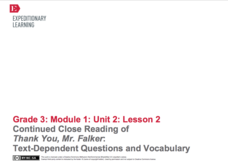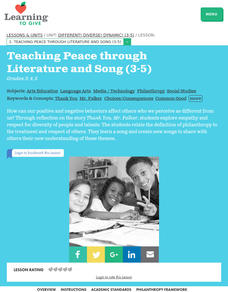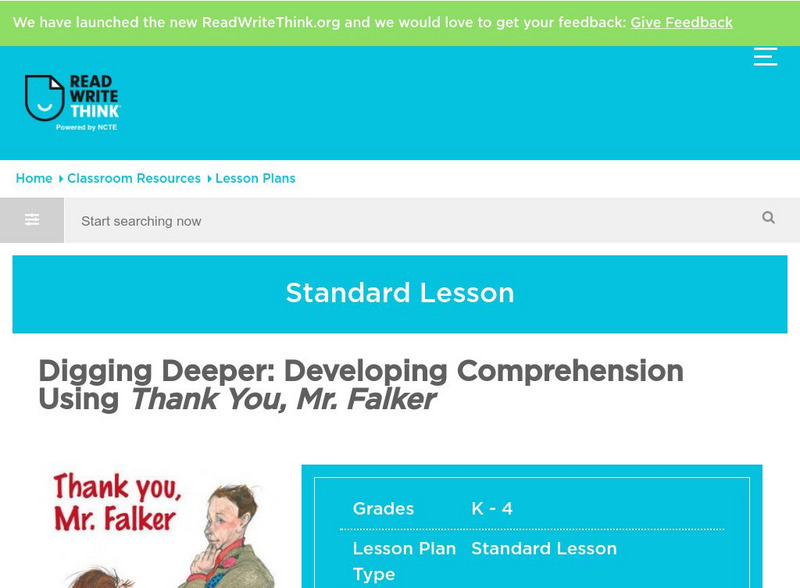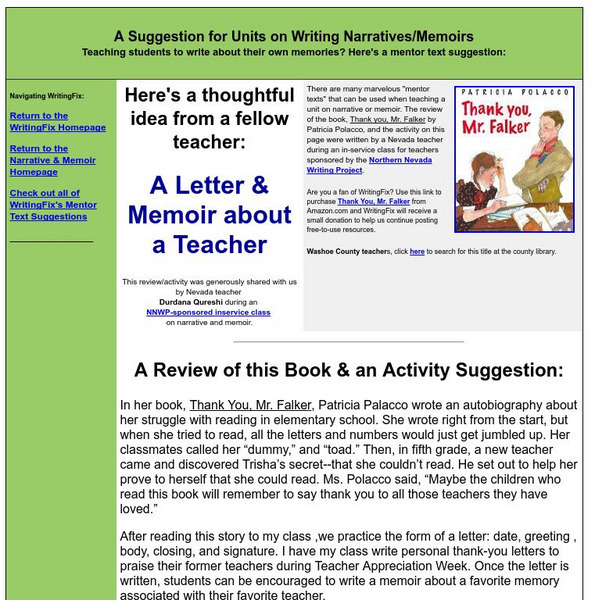EngageNY
Continued Close Reading of Thank You, Mr. Falker: Text Dependent Questions and Vocabulary
In the second lesson plan in a series that revolves around the story, Thank You, Mr. Falker, learners practice the skill of answering direct questions from the text while using complete sentences. After a teacher-led review of how to...
EngageNY
Close Reading of Thank You, Mr. Falker: Identifying the Superpowers of Reading
Third graders read excepts from the story, Thank You, Mr. Falker in order to gain practice in understanding an unfamiliar story by focusing on the details. They use a worksheet, embedded in the plan, which directs them to certain...
Curated OER
Why Thank You!
Fifth graders listen to a read aloud of Patricia Polacco's, Thank You, Mr. Falker! students examine the use of voice in the book, discuss the writing and theme ideas. They write a thank you not to their hero.
EngageNY
Mid-Unit 2 Assessment: On-Demand Informational Writing
Lesson 7 focuses on building academic vocabulary and writing an explanatory letter with supported textual evidence. For the first five minutes of the lesson, the educator reminds the class of how to read and refer to the accordion...
Curated OER
Different! Diverse! Dynamic! What Do Stories Share?
Students compare and contrast the stories, "Leo, the Late Bloomer," and "Thank You, Mr. Falker." They develop a Venn diagram, and write and illustrate the central theme of the stories.
Curated OER
Teaching Peace through Literature and Song
Negative effects of bullying come to light through listening to the book Thank You, Mr. Falker by Patricia Polacco. Class members identify philanthropic acts portrayed in the story and make illustrations to connect them to their own...
Curated OER
LEAGUE: Learning to Give
Young scholars explore the effects of human actions. In this respect and discrimination lesson, students read Thank You, Mr. Falker and identify the consequences of bullying and teasing. Young scholars then relate personal experiences of...
Curated OER
Compliments can Change the World
Students explore the definition of philanthropy as it relates to bullying. In this moral values lesson, students listen to the book Thank you, Mr. Falker and identify how the main character was bullied. Students define philanthropy, and...
Curated OER
What do Stories Share?
Students examine the philanthropic themes of two books. In this moral values and writing lesson, students complete a Venn diagram comparing the books Leo, the Late Bloomer and Thank You, Mr. Falker. The students discuss related themes...
Curated OER
Different! Diverse! Dynamic! Lesson 2: Teaching Peace Through Literature And Song
Students investigate bullying and discrimination and draw pictures of a personal response to being bullied. They read Thank You, Mr. Falkner by Patricia Polacco, to determine the philosophic act that the main character performs. They...
Curated OER
What Do Stories Share?
Students compare two pieces of literature using a Venn Diagram. In this comparison lesson, they use the graphic organizer to find the similarities and differences in Leo, the Late Bloomer, and Thank You, Mr. Falker. They discuss the...
Curated OER
Raise Awareness for National Learning Disabilities Month
Raise awareness of learning disabilities through reading, writing, research, and collaboration.
Curated OER
Appreciate Those Who Teach!
Discover a wealth of activities for teachers, pupils, and administrators to savor during Teacher Appreciation Week.
EngageNY
Developing Reading Fluency: Criteria for Reading Aloud
Third graders develop their reading superpowers in a lesson plan on fluency. After first listening to an audio recording or teacher read aloud, the class works together identifying criteria for fluent reading, focusing on phrasing, rate,...
Curated OER
Training Students for Literature Circles
Role sheets clearly define expectations of all group members in this introduction to literature circles. By using a variety of picture books or short texts, readers can practice roles while the teacher circulates to each group observing...
Curated OER
Narrative Writing
Students create new sentences using adverb clauses identified from a book. In this narrative writing lesson, students write new sentences from some of the dependent clauses used in a book read to them by the teacher. Students...
Curated OER
Looks Like Respect, Sounds Like Respect, Feels Like
Students explore philanthropy through art. In this service learning lesson, students discuss the diversity in their community and use their senses to create tolerance posters.
Curated OER
Uncommon Heroes of Today
Students create a photo-biography of someone they consider a real life hero. In this character sketch lesson, students define a hero and identify heroic characteristics in short stories. Students use descriptive words to...
Curated OER
Narrative Prompt - Lesson 2
Second graders review the structure of a narrative piece of writing. Individually, they write a narrative based on their best day of school. After being read different stories, they share their own narratives with the class. They are...
Curated OER
Is There a Stone in My Soup?
Students plan a service project. In this service learning instructional activity, students demonstrate their understanding of philanthropy as they plan a stone soup party.
Curated OER
Looks Like Respect, Sounds Like Respect, Feels Like
Students examine philanthropy through art using their senses. In this philanthropy lesson, students investigate what respect looks like, sounds like and feels like using their senses. They talk about diversity and tolerance before...
Writing Fix
Writing Fix: An Orginal Compare/contrast Lesson: The Most Memorable Teacher
Before writing, students should listen to and discuss the writing style of the picture book, Thank You, Mr. Falker by Patricia Polacco. This seven-step, teacher-created lesson was inspired by the NNWP's Going Deep with Compare and...
ReadWriteThink
Read Write Think: Developing Comprehension Using
Contains plans for three lessons that use the book "Thank You, Mr. Falker" by Patricia Polacco to teach making predictions and personal connections, as well as understanding the themes of the book. In addition to objectives and...
Writing Fix
Writing Fix: Suggestions for Memoirs: A Letter & Memoir About a Teacher
After reading the book, Thank You, Mr. Falker by Patricia Palacco, which is about a teacher helping a student overcome a long struggle to learn to read, students write a personal thank you letter to a teacher who helped them. Then they...

























